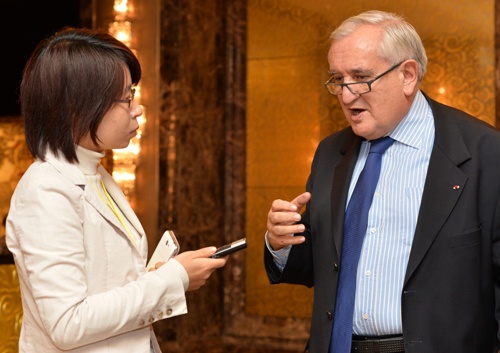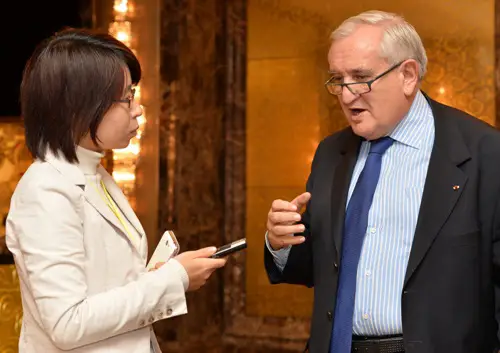By Jean-Pierre Raffarin Source: People's Daily

The history of the Silk Road sparks numerous aspirations for the ancient route. Hadrian, the Roman Emperor depicted by French writer Marguerite Yourcenar, was fascinated with the flourishing commerce and trade along the ancient Silk Road.
The “Belt and Road” initiative put forward by Chinese President Xi Jinping has amazed the world. There have been three highlights of the initiative.
First of all, the markets of Asia, Europe and Africa will be integrated into a community of common interest thanks to the initiative.
As the marginal effect generated from globalization has lessened, the world economy has come to need a new growth engine. The connectivity created by the initiative will present Asia with new growth opportunities.
By helping with the infrastructure projects of countries along the “Belt and Road” route, China will further open itself to the world and accelerate its development as well. What’s more, China has been making efforts to internationalize the RMB and transform its economic growth towards a focus on higher quality and more inclusiveness.
As all countries live on the same planet, none can survive like an isolated Robinson Crusoe. China-Europe cooperation will bring the latter economic growth and job opportunities, while Europe, Asia and Africa will turn into a community of shared interests, responsibilities and destinies in terms of geopolitical strategy.
Though globalization led by Western countries did bring prosperity to cities and coastal areas, villages, inland areas and Oriental countries were left behind. By calling for a “global rebalance,” the initiative points to a brighter future for globalization.
Second, new driving forces are emerging in Asia. Asia is becoming a global engine for structural reform by reforming and opening up to the world. Its vitality will bolster European growth as well.
Since Asian countries have always believed that “Europe is the key to globalization,” it is more of an imperative for them to focus on the European market, especially considering that, at present, the US is neglecting Europe after pivoting toward the Asia-Pacific region.
Europe-Asia cooperation will bring balance to the future world. Europe should take this opportunity to return to the center of the world stage, and in this way, reshape the transatlantic relationship between Europe and the US.
Third, the initiative highlights both cultural and economic development. Western dominated globalization, while bringing in competition, also introduced some destructive effects: retrogression of civilization, prevailing individualism and irrational behavior. The recent chaos in the Western world, including a resurgence of populism, a chaotic US presidential election and Brexit, have shaken the world.
Given this backdrop, the geopolitical and strategic entity of Europe, Asia and Africa, which is represented by Egypt, Greece, India and China, needs to shoulder the responsibility of rejuvenating human civilization.
Right now, cultural exchanges within the framework of the “Belt and Road” are blossoming. For example, the second China-France culture forum, themed “the Belt and Road: Cultural Communication and Integration,” will be held in Lyon, France in 2017.
The “Belt and Road” initiative is more than just a theory, it is a new model for governance thanks to its plentiful financial instruments and multilateral mechanisms.
The Asian Infrastructure Investment Bank (AIIB), that was proposed by Xi Jinping and established in 2013, now holds over $100 billion of subscribed capital, which will allow it to effectively propel development. The establishment of AIIB, the New Development Bank and the Silk Road Fund sends a message to the world that China is more than capable of implementing the initiative.
While the initiative is sure to test the French government’s wisdom and judgment when it comes to deciding how to respond to and dovetail development strategies with the “Belt and Road” initiative, France welcomes and supports the initiative, because it is directly linked to its interests and strategic plans.
(The author is the former French prime minister and chairman of the Senate Committee for Military, Defense and Foreign Affairs)
The “Belt and Road” initiative put forward by Chinese President Xi Jinping has amazed the world. There have been three highlights of the initiative.
First of all, the markets of Asia, Europe and Africa will be integrated into a community of common interest thanks to the initiative.
As the marginal effect generated from globalization has lessened, the world economy has come to need a new growth engine. The connectivity created by the initiative will present Asia with new growth opportunities.
By helping with the infrastructure projects of countries along the “Belt and Road” route, China will further open itself to the world and accelerate its development as well. What’s more, China has been making efforts to internationalize the RMB and transform its economic growth towards a focus on higher quality and more inclusiveness.
As all countries live on the same planet, none can survive like an isolated Robinson Crusoe. China-Europe cooperation will bring the latter economic growth and job opportunities, while Europe, Asia and Africa will turn into a community of shared interests, responsibilities and destinies in terms of geopolitical strategy.
Though globalization led by Western countries did bring prosperity to cities and coastal areas, villages, inland areas and Oriental countries were left behind. By calling for a “global rebalance,” the initiative points to a brighter future for globalization.
Second, new driving forces are emerging in Asia. Asia is becoming a global engine for structural reform by reforming and opening up to the world. Its vitality will bolster European growth as well.
Since Asian countries have always believed that “Europe is the key to globalization,” it is more of an imperative for them to focus on the European market, especially considering that, at present, the US is neglecting Europe after pivoting toward the Asia-Pacific region.
Europe-Asia cooperation will bring balance to the future world. Europe should take this opportunity to return to the center of the world stage, and in this way, reshape the transatlantic relationship between Europe and the US.
Third, the initiative highlights both cultural and economic development. Western dominated globalization, while bringing in competition, also introduced some destructive effects: retrogression of civilization, prevailing individualism and irrational behavior. The recent chaos in the Western world, including a resurgence of populism, a chaotic US presidential election and Brexit, have shaken the world.
Given this backdrop, the geopolitical and strategic entity of Europe, Asia and Africa, which is represented by Egypt, Greece, India and China, needs to shoulder the responsibility of rejuvenating human civilization.
Right now, cultural exchanges within the framework of the “Belt and Road” are blossoming. For example, the second China-France culture forum, themed “the Belt and Road: Cultural Communication and Integration,” will be held in Lyon, France in 2017.
The “Belt and Road” initiative is more than just a theory, it is a new model for governance thanks to its plentiful financial instruments and multilateral mechanisms.
The Asian Infrastructure Investment Bank (AIIB), that was proposed by Xi Jinping and established in 2013, now holds over $100 billion of subscribed capital, which will allow it to effectively propel development. The establishment of AIIB, the New Development Bank and the Silk Road Fund sends a message to the world that China is more than capable of implementing the initiative.
While the initiative is sure to test the French government’s wisdom and judgment when it comes to deciding how to respond to and dovetail development strategies with the “Belt and Road” initiative, France welcomes and supports the initiative, because it is directly linked to its interests and strategic plans.
(The author is the former French prime minister and chairman of the Senate Committee for Military, Defense and Foreign Affairs)
 Menu
Menu
 ‘Belt and Road’ initiative points to brighter globalization
‘Belt and Road’ initiative points to brighter globalization
















